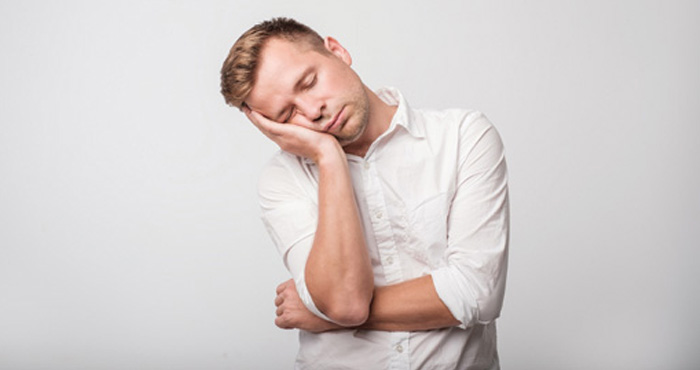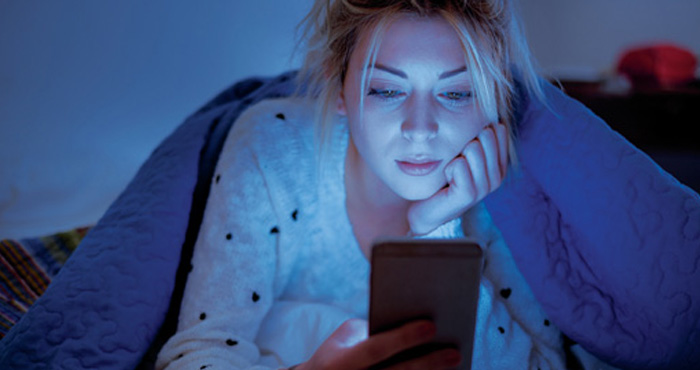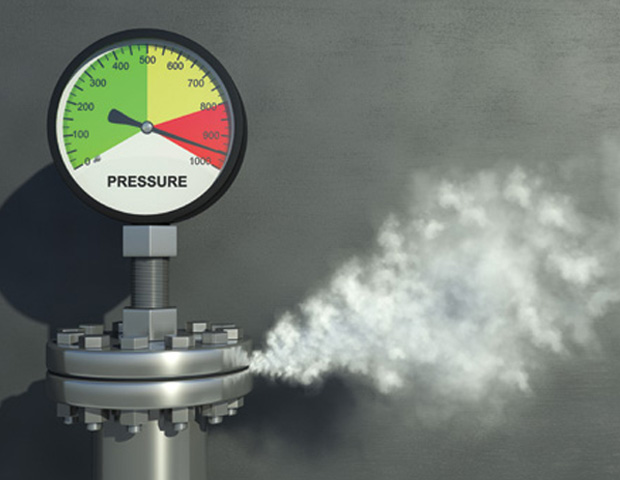In OTC
Follow this topic
Bookmark
Record learning outcomes
While the body’s need for a good night’s sleep is increasingly understood, research shows that we’re actually sleeping for less time than ever before due to anxiety and stress

Learning objectives
After reading this feature you should be able to:
- Explain the causes of stress and insomnia
- Provide sleep hygiene and lifestyle advice
- Determine the rightquestions to ask customers about sleeplessness
In a poll of over 5,000 people conducted on behalf of the Sleep Council1, three-quarters (74 per cent) of respondents said they now sleep for fewer than seven hours a night, putting them at the lower end of the six to nine-hour spectrum that the NHS suggests an adult requires2.
That in itself is not a problem, according to Dr Neil Stanley, an independent freelance sleep expert who has been involved in sleep research for more than 37 years, both at the Institute of Aviation Medicine and as director of sleep research at the University of Surrey. There are no hard and fast rules about the amount of sleep each person needs, he says. “It is more about getting the right amount for the individual that allows them to feel awake and refreshed the next day.”
What is becoming a concern, however, is the growing number of people reporting problems with the quality of their sleep. This is evidenced by more than half of respondents in the Sleep Council study (53 per cent) who cite stress/worry as the number one cause of their inability to get a good night’s rest, compared with 45 per cent when the survey was first carried out in 2013.
Some 35 per cent of respondents say they have been experiencing sleep problems for more than five years, with one-fifth saying it has been 10 years.
Too anxious to sleep
Around a third of the UK population will suffer from a temporary bout of insomnia2, with stress commonly listed as one of the leading causes. While such episodes can be expected from time to time, the long-term consequences of sleep disruption leave no room for complacency.
There may be much yet to learn about why we sleep, but what scientists do know is what happens when we don’t, says Jason Ellis, professor of sleep science at Northumbria University, director of the Northumbria Sleep Research Laboratory and chair of the research committee at the British Sleep Society. In the short term, he says, the effects of poor sleep can be witnessed almost immediately – through a change in mood, memory and performance, as well as a person’s ability to problem-solve or handle their emotions.
Ongoing sleep disruption, meanwhile, can prevent the body entering slow wave sleep, robbing vital systems of the ability to carry out essential restorative and regenerative processes on both the mind and body. This can put poor sleepers at increased risk of cardiovascular diseases and diabetes or cause complications in the case of chronic conditions. The risk of developing anxiety-related psychological disorders and depression is also heightened.
“The relationship between anxiety and insomnia is very strong,” Professor Ellis says, “with worries over something that is happening or going to happen frequently resulting in a loss of sleep. During such episodes, the body converts this flight or fight response into anxiety, which, in turn, causes it to remain awake in order to deal with that stressor. Historically, this type of response was intended to protect against imminent danger – such as fire or a predator – but as humans have evolved it has become much more internalised.”
Research by the Mental Health Foundation puts this sharply into context – 74 per cent of the UK adults it surveyed in 2018 acknowledged they had felt so stressed at some point over the past year that they had felt overwhelmed or unable to cope3.
Unfortunately, it is all too easy to become caught in a vicious cycle of chasing sleep, according to experts, where anxiety and a lack of sleep simply fuel each other.

“We know there is a relationship between sleep and mental health,” says Rachel Boyd, head of information content at mental health charity Mind. “Not being able to get good quality rest can lead to mental health problems or make existing problems worse, and a common symptom of a variety of mental health problems is affected sleep. Equally, lack of sleep, particularly over a period of time, can increase someone’s risk of developing a mental health problem like anxiety, depression or psychosis.”
Harvard Medical School reports that chronic sleep problems affect 50-80 per cent of patients in a typical psychiatric practice, compared with 10-18 per cent of adults in the general US population4. This issue is particularly common among patients with anxiety, with sleep problems said to affect more than 50 per cent of adult patients with generalised anxiety disorder (GAD), as well as post-traumatic stress disorder (PTSD), panic disorder, obsessive-compulsive disorder and phobias.
In the case of anxiety disorders such as PTSD, the Harvard report states that sleep disruptions can worsen anxiety or prevent recovery. Sleep problems were found to be particularly prevalent in children and adolescents.
While the Harvard findings identify insomnia as a risk factor for developing an anxiety disorder, this is even more the case with major depression. A longitudinal study of teenagers suggests that sleep problems preceded anxiety disorders 27 per cent of the time, while they preceded depression 69 per cent of the time.
The relationship between anxiety and insomnia is very strong
Role of community pharmacy
Often the first port of call for healthcare advice, pharmacists can help spot any emerging or ongoing issues with sleep.
In the Mental Health Foundation’s survey, long-term health conditions (either a person’s own, or those of close family and friends) emerged as the top stressor among 36 per cent of all adults, rising to 44 per cent in the over-55s3 – making it likely that pharmacy teams will regularly come into contact with customers at risk of developing sleep problems.
According to Rachel Boyd, valuable assistance could be offered by making sure anyone taking prescribed medication such as sleeping aids or selective serotonin reuptake inhibitors (SSRIs) for their sleep problems is given the full picture about their treatment – and particularly any potential adverse side-effects. “We would like to see pharmacists urging people to tell their GP about any concerns they have,” she says, “especially if their sleep is impacting their daily lives.”
Professor Ellis believes this level of insight applies across the board. “Pharmacists are going to have detailed knowledge of any medications that can mask insomnia, which can be passed onto the patient. In many cases this could prove to be a quick fix and an easy win.”
However, the first thing a pharmacist needs to do is understand what problems can exist, he says. “To put this into context, there are around 27 types of sleep disorder, which makes it essential for pharmacy teams to be able to follow a pathway to the right treatment. This type of activity is already well-established in Australia and I’d love to see some more like-minded initiatives in the UK, with pharmacy teams able to ask the right questions and achieve successful outcomes.”
It is important to note, however, that many customers may not choose to raise the subject themselves. “We know it takes people a long time to speak with their doctor about it,” says Professor Ellis, “but that is very much the nature of insomnia – which is characterised by people being awake and alone at night, with only their thoughts for company. People often consider themselves to be the only one with the problem. However, by taking the time to point out how common such issues are, as well as offering more information or even workshops in-house, pharmacy could build much greater awareness and really get people talking. In a number of cases this could even prevent the problem taking root.”
Key facts
- There are around 27 types of sleep disorder
- Many people now sleep for fewer than seven hours a night
- Insomnia has been identified as a risk factor for developing an anxiety disorder and other chronic conditions
Taking the time to listen
If someone is found to be struggling with their sleep – either through an existing mental health problem or because their sleep is causing poor mental health – Rachel Boyd recommends that pharmacy teams try asking open questions to find out how someone is feeling, being careful to listen non-judgementally.
“Lots of us fear saying the wrong thing, even those working within healthcare, but staying silent can make things worse,” she says. “Pharmacists should aim to create a welcoming environment where everyone feels able to talk openly about problems with their physical or mental health.
“Encouraging people to seek further help from their GP can also help them access services like talking therapies or mental health support. We want to see anyone who could benefit from things like talking therapies offered a range of treatment options on the NHS, within 28 days of being referred.”
Learning how to switch off
Stress management techniques are often used with the aim of toning down any worries, reducing cortisol and adrenaline levels that have a wake-inducing effect. Often coming under the umbrella of ‘sleep hygiene’, such measures can include diet and exercise, and room design and bedtime routine. The measures are designed to ensure that a person is in the most relaxed frame of mind for achieving a night’s rest.
“The two things you really need for good sleep are a quiet mind and a relaxed body,” says Dr Stanley, “so people need to actively disengage from sleep disruptors. This means a person’s phone, computer or tablet should be turned off, preferably a couple of hours before bed. The bedroom should be a sanctuary for sleep, not an office, games room, cinema or gym.
“Instead, people should set aside a time where the affairs of the day are put to one side and prepare for sleep. Having a pen and paper beside the bed also means that any thoughts that might pop into their head can be captured.”
According to Rachel Boyd, some people find certain things will also help them to relax when going to bed – such as listening to music, having a bath, breathing exercises, muscle relaxation and visualising happy memories. Some people also find it useful to talk to someone about things that are worrying them, or writing them down, before going to bed, she adds.
Diet and exercise have both been linked to sleep, with recommended do’s including consuming milk, cherries, chicken and other good sources of melatonin (said to promote good sleep), while curry and alcohol firmly sit in the category of don’ts. Yoga is an ideal exercise and de-stressor, although any exercise is recommended (but not to the point of exhaustion as this can actually hinder sleep).
What happens when we sleep?
Slow wave sleep is essential to the body’s ability to repair and restore itself. During this period of slumber, breathing, respiration and heart rates will drop and become fairly constant, with attention, short-term memory and perception also going offline.
Cognitive behavioural therapy
While such steps may work for some, Professor Ellis points out that pharmacy teams need to be aware that, in many instances of anxiety-related sleep issues, the problem is not one of relaxation, but rather heightened tension. “In such cases no technique or sleep aid is going to change that dynamic and, in fact, focusing too much on such measures could actually exacerbate the issue,” he says.
“What I tend to find is that the people who come to me with insomnia have excellent sleep hygiene and have been practising these types of things for years but without success.”
In such cases, cognitive behavioural therapy – insomnia (CBT-I) has become a leading intervention, looking to apply stimulus control by resetting a person’s circadian rhythm (body clock) and homeostatic system (drive to sleep).
According to Professor Ellis, who runs his own sleep clinic and conducts research with patient groups, CBT-I is widely regarded as an excellent way of treating insomnia, with studies showing it to be as effective as sleep medication. One of its key elements is a strict waking hour, regardless of how much sleep might have been lost – with the aim of encouraging the body to re-adjust to its natural rhythm.
“If you ask someone without sleep problems how they get to sleep, they wouldn’t be able to tell you,” he says, “because for them, it just happens. Essentially, that is what you are aiming for with any form of insomnia treatment – helping a patient get to a point where they are not actively trying to sleep.”
I fear there’s a danger of creating a situation where people are over-monitoring their sleep
Always on...
Technology is increasingly being viewed as a major culprit for poorer nocturnal habits, with the so-called Netflix effect often prompting people to binge-watch their favourite programmes instead of going to bed. The uptake of smartphones and tablets among all age groups is also making it ever easier to remain ‘on call’ for social media updates and work-related matters.
In Ofcom’s latest Communications Market Report 2018, people claimed to spend a total of one day a week online (24 hours), more than double the time cited in 2007.
The report found that more than a third of adults (37 per cent) check their phones five minutes before lights-out, a figure that increases to 60 per cent for the under-35s.

Sleep aids
In cases of short-term insomnia, Dr Stanley says pharmacy teams can recommend sleep aid products to customers who have already tried making lifestyle changes, but are still affected by temporary (not chronic) sleep disturbance and deprivation.
“Herbal remedies are available and contain ingredients such as valerian, which has been shown to improve sleep quality in people with insomnia,” he says. “Some remedies need to be taken on a daily basis for a few weeks to have the optimal effect. Over-the-counter sleep aids, such as antihistamine-based preparations, are suitable for those dealing with short-term sleep problems.”
Sedating antihistamines such as diphenhydramine and promethazine block the actions of histamine, which stimulates arousal-promoting areas of the brain, he says, and cause a feeling of drowsiness. “They can be effective within hours.”
Pharmacy teams can also assess if customers would benefit from anti-snoring aids such as throat sprays, acupressure rings, nasal strips or plasters, and even mouth guards if snoring is affecting sleep quality, he adds.
“Also make sure any pain-relieving medication is taken as prescribed. Using products that address the problems caused by light or noise can also help.”
According to Mintel, one in three adults (32 per cent) have used sleep aids (including aromatherapy products, botanical-based tablets or capsules, sound machines, melatonin-based tablets or capsules, oral sprays and patches and strips)6. Of those products, aromatherapy sleep aids (21 per cent) and botanical-based tablets/capsules (14 per cent) were the most commonly used.
While dedicated apps claim to offer unprecedented insights into sleep, Professor Ellis has some concerns about the use of such technology. “In the first instance, a lot of the claims they make have not been properly validated,” he says. “And secondly, while having more knowledge can be a valuable thing, I fear there is a danger of creating a situation where people are over-monitoring their sleep, something that could very easily prompt them to become so consumed by the idea of it that it actually stops the process.”
Seven steps to better sleep
The Sleep Council’s guide Seven Steps to a Better Night’s Sleep offers detailed advice on good habits that can encourage better sleep.
References
- Great British Bedtime Report 2017. The Sleep Council. Conducted by Atomik Research
- NHS Conditions: Insomnia
- Mental Health Statistics – Stress. Mental Health Foundation. Conducted by YouGov 2018
- Sleep and Mental Health. Harvard Medical School. Article updated: 18 March 2019
- Communications Market Report 2018.Ofcom
- The Wide Awake Club – Half of Brits struggle to sleep. Mintel research 2017

